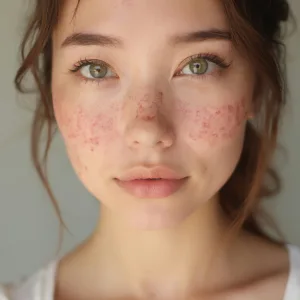Acupuncture
Alternative Acne Treatments
 Acne has many faces. Why does it land on us? Our faces and backs, upper or lower back? Why for some of us is it itchy, while not for others? For some it is painful. Some women get flares on their cycle, or just after. Why?
Acne has many faces. Why does it land on us? Our faces and backs, upper or lower back? Why for some of us is it itchy, while not for others? For some it is painful. Some women get flares on their cycle, or just after. Why?
The Jue Yin-Yang Ming mechanism is one of the most important connections in Chinese medicine. It dictates that our body must have enough healthy fluids and inhibitory substances in reserve, such as estrogen, dopamine, etc., to mitigate inflammatory heat from flaring upward in the body, whether vertically up (to the face and head) or simply upwards from the “organ layer” to the skin.
For those not prone to “heat pathologies” (approximately half the population) this “flare” will likely manifest in different ways—if it does so dermatologically the skin is less likely to be red and/or angry.
If you’re like myself the skin is likely to turn red. If there is itchiness it indicates damp fluid retention (often sebum oil) trapped on the surface—the itching being its attempt to vent (follicular hyper-keratinization)—and/or some central nervous system dysregulation, i.e. a potential stress component. The reason scratching ultimately makes things worse is because the manual aggression ends up pushing the fluid retention a tad bit deeper beneath the surface, no doubt to resurface soon thereafter. Although scratching to bleed is not advisable, it does generally provide longer-lasting relief via its ability to vent some of the pathogenic fluids within the blood. If there is pain at the site, there is probably some degree of local blood stagnation. This often coincides with the week leading up to one’s menses, whereas symptom flares on the heels of one’s menses points more to “Jue Yin” fluid and/or blood deficiency.
Dermatologists often recommend Spirinolactone, which works by stopping aldosterone from signaling the kidneys to reabsorb sodium. This might be a wonderful Band-Aid for some, but unfortunately over time can cause issues as sodium is an essential mineral for transporting nutrients across cell membranes, also for regulating blood pressure. This might explain why two of its most common side effects are dizziness and gastrointestinal issues.
In the treatment of acne it is first important to rule out itching—whether there are oily pathogens beneath the surface and/or an emotional component, that needs our attention. Most important is the Jue Yin-Yang Ming axis. How much heat must our acupuncture and herbal medicines stop from flaring to the person’s skin and how much blood and/or inhibitory substances must we generate to prevent further flares? Dosages or points might be modified on a weekly basis. Striking this prescriptive balance is the key to optimize clinical outcome.
As for self-care, it is advisable in almost all skin conditions to go off dairy for the lifecycle of a red blood cell, or 120 days. Dairy contains the hormone, IGF-1, which increases sebum production. Many people can resume in moderation afterwards. Red meat can go either way as it helps to generate blood and fluids, but can also generate bodily heat. Where one falls along the Jue Yin-Yang Ming imbalance will decide how much steak is advisable. As far as protein goes eggs, fish, and tofu are ideal, as they don’t generate as much heat in the body.
Point Profile for Reflux: Stomach 36

The first acupuncture point whose name I learned and was able to identify while my (first) acupuncturist was needling me was “Stomach 36”—”Zu San Li,” or “Three Leg Mile,” in reference to its alleged ability to help the patient walk three additional miles, as all transportation at the time of its discovery was obviously by foot.
“Li,” in Chinese, may also be used as a homonym for “to rectify,” in reference to the energy the point provides, either to our internal physiologies or our kneecaps it resides just inches below. (Yes, this is the point that should feel like a brief surge of shin splint down your tibia)
In modern times we are not as concerned with the need to walk a few extra miles, but the physiological intent holds relevant. Located along the anterior tibial nerve, Stomach 36 can be used to improve energy by its mechanism of increasing blood flow to the stomach, when indicated. That is, if someone is lethargic because they had five drinks the night before and only slept five hours it’s not because their organs are lacking blood. They probably need a different acu-point combination (and a nap).
Besides GERD or acid reflux, Stomach 36 is useful for treating numerous pathologies, including but not limited to diarrhea, bloating, pain of the abdomen, vomiting, belching, also conditions of the throat, chest, and lungs because of the gastrointestinal microbiome’s connection to the respiratory microbiome; finally anxiety, depression, and dizziness, because of the gut brain connection. This 2023 NCBI study concluded its ability to increase the length and mean basal pressure of the lower esophageal sphincter, of which both mechanisms reduce reflux.
According to Peter Deadman’s Manual of Acupuncture, “the great Han dynasty physician (and weren’t all great physicians from the Han??), Hua Tou, is said to have valued the use of ‘ST-36’ to treat the ‘five taxations’ and the ‘seven injuries.’”
The 5 Taxations:
- Excessive use of the eyes injures the blood (even before cell phones—imagine now!)
- Excessive lying down injures the qi (i.e. hypersomnia begets more hypersomnia)
- Excessive sitting injures the flesh (i.e. lack of exercise saps our energy)
- Excessive standing injures the bones (poor security guards)
- Excessive walking injures the sinews (any other New Yorkers remarkably inflexible?!)
Because everything starts and circulates out from the gut, if I had to choose one point to needle on every patient for the rest of my career it would be Zu San Li, Stomach 36. With appropriate metabolic fluids, we can optimize our production of nutrients, which in turn reaches all other systems of the body. Basic science.
Happy New Year, from DFA!
 A quick re-cap on the year 2025 in the rearview, the “year-view,” if you will, otherwise “year in review” (clearly being a dad is impacting my jokes)!
A quick re-cap on the year 2025 in the rearview, the “year-view,” if you will, otherwise “year in review” (clearly being a dad is impacting my jokes)!
A lot of business as usual in the way of business—my same schedule of 3 days a week in the office, plus one supervising in the school clinic at Pacific College, partially highlighted by our appearance on Ben Aaron’s PIX-11 News segment.
I also gladly welcomed my first ever part-time assistant, Kira Schneider, a great acupuncturist in her own right, with a private practice in Princeton, New Jersey.
This year’s continuing education was also more of the same, as Chinese medicine’s foundational text, the Shang Han Za Bing Lun, takes a lifetime to study and master. In addition to reading my nightly passages, I credit Genevieve Le Goff of California, with most of the knowledge I gained last year.
In the first week of this new year I’ve added to my repertoire, virtually lecturing 2 courses per week on Classical Chinese herbal medicine with the Virginia University of Integrative Medicine, which happens to have a New Jersey campus located just a few miles from my mom.
Speaking of which, Mom’s hangin’ in there, my wife, Dr. Jillian Cohen, just got the first ever fellowship at Hackensack Meridian Health’s Integrative Medicine department approved, and daughter Peyton has since turned 4 and 4 1/4, rapidly approaching 4 1/2, and has not been made aware that she’s about to have her second trip to Disney in two years (hopefully this time sans coronavirus). She remains infatuated with everything princesses and drawing (including occasional household furniture vandalism), and her bilingual Spanish abilities are improving, inevitably to surpass my own.
Curious to hear if anyone has any exciting news from last year and/or regarding the year to come—especially if it’s something I should be sharing on my newsletter to benefit fellow clients and friends.
T.J. Watt’s Dry Needling Injury: What Happened?

This past week, T.J. Watt of the Pittsburgh Steelers, suffered a pneumothorax (partial lung collapse) as reported by CBS SPORTS, after a dry needling accident at the team’s practice facility—the entire acupuncture community sighed in despondent frustration. For several years now, most licensed acupuncturists have taken exception to clinicians of other modalities appropriating from what we do, rebranding it as something new, and in some instances causing harm due to a lack of education.
As defined by the American Physical Therapy Association, dry needling is a modality that uses filiform needles to stimulate myofascial trigger points, muscular, and connective tissues, to treat pain and impaired range of motion.
Accoring to Theodore Levarda, sports medicine and dry needling acupuncturist of Morningside Acupuncture in New York, wrote: “Dry needling and acupuncture use the same acupuncture needle, but practitioner education, clinical training, and safety standards vary widely across professions. Licensed acupuncturists undergo extensive, formal training in needle-based procedures, anatomy, and safety protocols, while dry needling training for other professions is not standardized.”
To contrast licensed acupuncturists thousands of hours of education, plus national boards exams, nowadays there are many physical therapists, chiropractors, and MD’s taking 100-hour crash courses in acupuncture and/or “dry needling,” getting certified, and frankly, utilizing a medical modality they no little to nothing about. Pneumothorax is incredibly easy to avoid, as Watt’s is the first case of its kind I’ve heard of since beginning my own practice in 2013.
Linebacker, Patrick Queen, of the Steelers, cited two reasons why he prefers acupuncture to dry needling: “Kind of two different things: One [acupuncture], you got to go to school for a longer period of time. There’s a whole much more scientific thing that goes into it. I don’t do the whole dry needle thing. I’m actually scared of dry needling, so I kind of stay away from that stuff.”
While licensed acupuncturists appreciate Queen’s allegiance, what might be most interesting is the publicly accepted misconception of non-acupuncturists’ erroneous or even intentionally dishonest definition of the modality. It probably isn’t the dry needling that’s the problem but the practitioner behind the needle.
What you might find in an AI search and detailed on most web sites of non-licensed acupuncturists offering dry needling, and even WebMD and Cleveland Clinic, is an allegation that it is some uniquely modern approach to pain management, supposedly based on scientific evidence and western anatomy—whereas acupuncture is predicated on balancing some “energy,” or “life force” through “meridians” in the body. This stems from an old misinterpretation that is ripe for rectification—maybe we’ll have T.J. Watt to thank for his sacrifice to this end.
According to Donald Kendall’s book, The Dao of Chinese Medicine (2002, in 1901 George Soulie de Morant studied in China, then returned to Paris with a working understanding of the medicine, but several understandable gaps in comprehension. He mistranslated “Qi” as energy and “Jing” as meridian, the latter because of its applicability to almost anything longitudinal, including even agricultural fields. Whether due to the communication gap or geographic distance, over one hundred years later, most of us still operate under this same misguidance.
While the (Chinese) idea of “qi” might be broadened to refer colloquially to energies both within and outside of the body, in terms of medicine and physiology it is thought of as simply the systemic sum of our intake of air and food, which is exactly how its Chinese character reads. 氣
The food part is self-explanatory. The air, according to Kendall, as well as other scholars, such as Andrew Miles and Nigel Wiseman, encompasses oxygen and nitric oxide that travel within vessels (not “meridians”) or neurological pathways and carry blood and functional gases to our organs to either reduce inflammation or optimize functionality. Andrew Miles even outlines throughout his book, Enlighten Weight, the countless similarities between what nitric oxide does in the body and what Chinese medicine states are functions of qi, such as:
- Increasing body temperature
- Facilitating metabolism
- Capable of causing pain when stuck or trapped
In addition to “energy” and “meridians,” another term you can throw out with the bath water is “dry needling.” Dating back to the Han Dynasty thousands of years ago are medical texts that denote “ashi points” for needling. “Ashi” translates literally as “That’s the point,” in reference to local sites of pain, palpably taut bands, which ancient Chinese practitioners targeted with the intention of improving local perfusion and restoring normal muscular sarcomere length, precisely what supposedly distinguishes “dry needling.”
What’s more, there have been studies dating back as far as Ronald Melzack’s proving that 71% of the neuromuscular trigger points in the body correspond with acupuncture points, based on spatial distribution and associated pain patterns.
There is nothing wrong with dry needling, except for its name and prerequisites. Dry needling is local acupuncture. It’s been around for centuries. It is best administered by licensed acupuncturists who earned a master’s degree after four years of schooling, as opposed to clinicians of other modalities without ten percent the same education.
To Morning Exercise or Not to Morning Exercise

Patients (and students) can be good teachers, and one recently reminded me of an important premise, as she reported feeling much better since beginning to exercise in the morning upon waking, before breakfast, before doing anything else. For her, this made sense. For approximately the other half of the population it would not.
Sunrise in Chinese medicine is Shao Yang time, the time of day that corresponds, logically, with the body’s pivot, that is the system whose responsibility it is to use cortisol to bring vital substances, such as immunological or hormonal, upwards in the body. For those of us whose cortisol spikes too quickly or too early, exercise is one way to temper this surge. Interestingly, healthy food is another way. While physical movement can clear some of the inflammatory heat associated with morning cortisol, a proper breakfast of protein, unrefined sugars, and/or healthy fats can also act as an anchor to prevent it from spiking so much in the first place. For the types of people more prone to insomnia, hyperactivity, and fast metabolisms, it seems a moderate morning workout shortly followed by breakfast might be ideal.
For the opposite body type, prone to hypersomnia, chronic fatigue, and/or weight gain, a better time to exercise might be the time of day associated with the most “yang qi,” or warmth, closer to 12 noon, as these people tend to be more lacking in cortisol, as well as other excitatory chemicals, and therefore will benefit more by moving in accord with the environmental nature around them.
For those of us with small children at home, who cannot exercise upon waking, or those with jobs that preclude us from exercising just before lunch, I recommend doing what you can. Everyone is busy, but if you can find 15-30 minutes/day to get in your preferred form of movement, almost every scientific study on the subject since the beginning of scientific studies corroborate the benefit.

